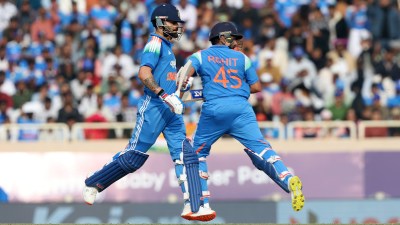On grass, Uzbeks hope for feat of clay
The conditions may be alien and the crowd undoubtedly partisan, but what was surprising was the behaviour of the Uzbek team during the day&#...

The conditions may be alien and the crowd undoubtedly partisan, but what was surprising was the behaviour of the Uzbek team during the day’s first match.
It couldn’t have been in greater contrast to that of the Indians. While the home team cheered their captain on every point scored and every unforced error committed, the Uzbek bench was eerily silent.
Farrukh Dostov wasn’t listening to his captain Vadim Kutsenko, who wasn’t saying anything much in the first place. And when Dostov’s serve started breaking up, it was surprising to see the captain going about his work quietly while his ward rested and refreshed himself between games.
In one way the Uzbeks’ gloom was understandable. Having never played on grass before, and never faced the Indians in the Davis Cup, they were up against a lot of unknown factors. Add to that the fact that the court had uneven bounce and was still a little damp when play started in the morning, and the visitors can be excused for not counting their chances in the tie.
‘‘They have grown up on grass courts. They just have the feel of it’’, said Kutsenko.
‘‘They would definitely not have it so easy had it been on clay or hard courts’’, added Dostov. ‘‘And anyway I have seen better grass courts than this.’’
Bal agreed with the first point. ‘‘I don’t say the result may have been drastically different but these guys are much better than on today’s game. Things would definitely have been much closer if the tie was on clay in Uzbekistan’’, he said.
He stressed one point: grasscourt players are not created in 10 days. ‘‘They practiced in Delhi, and here, but it just is not possible to become familiar and comfortable with grass so soon. But then, that is what home advantage is all about.’’
Perhaps they had already given up before the match. ‘‘We still have a chance in the tie, if someone breaks a leg’’, quipped Dostov. But the humour fails to conceal their disappointment. ‘‘The result changes nothing for us’’, was Kutsenko’s summation at the end of the day.


- 01
- 02
- 03
- 04
- 05





























